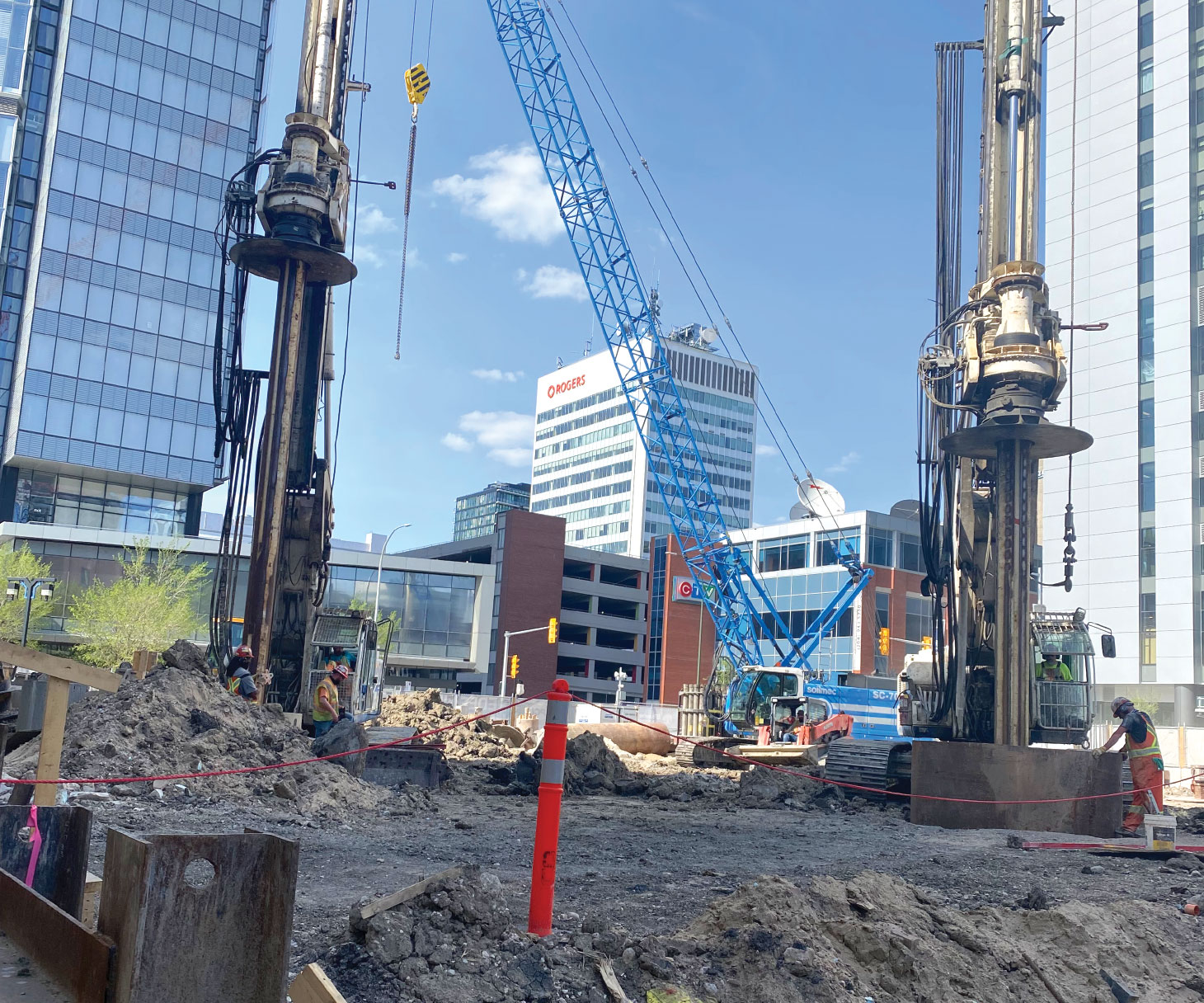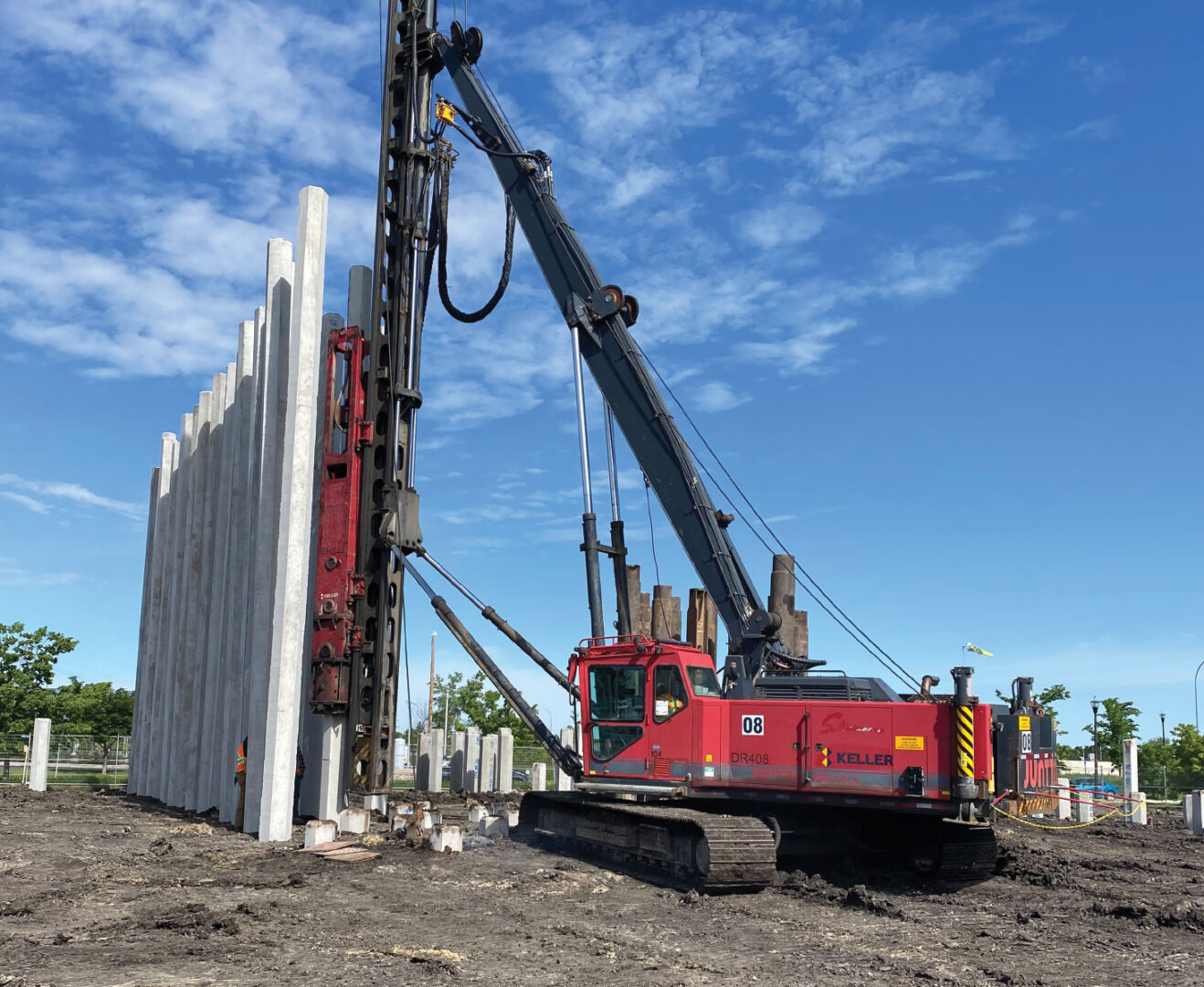
With about 10,000 employees and operations across five continents, Keller, which has offices in Toronto, Montreal, Vancouver, Edmonton, Regina and Saskatoon, added Manitoba to its slate of Canadian locations in 2021 by purchasing Subterranean, a well-known deep foundations firm based in Winnipeg.
Dan MacLean, business development executive at Keller, says the company was looking to expand its geographic footprint and customer base in Western Canada, and Subterranean was the logical choice to do that.
“Manitoba was a place Keller did not have much of a market share in at the time, so it was an area in Canada that we were looking to expand into,” MacLean said. “Subterranean was always a good name (and) was a leading player in the Manitoba market. They had established strong relations with their clients and a good reputation for consistent, safe, high-quality work.”
He says that Subterranean specialized in driven pile and cast-in-place foundations, technologies frequently used by Keller in Canada and around the world, which added to its appeal. Keller’s Winnipeg office continues to operate under local management. The team includes operations manager Darryl Kaluzny, a long-time Subterranean employee whose father, Bill Kaluzny, also worked there. Darryl says Subterranean was a multi-generation family business with roots going back to 1949.
Darryl says the company’s original owner, Mark Mignacca, worked as a finishing carpenter in Winnipeg’s River Heights neighbourhood. At the time, Mignacca had many customers asking him to come and adjust their doors every year, the result of shifting ground conditions beneath their homes.
“He looked at what he could do to keep that from happening, and that’s when he started doing underpinning work,” Darryl said. He adds that during Subterranean’s long history, the company contributed to many major building projects in Winnipeg, including the Canadian Museum of Human Rights and the James Richardson International Airport.

Vision for growth
The acquisition of Subterranean has not only expanded Keller’s geographic footprint, but also enhanced its service offerings. According to MacLean, Keller’s vision for Subterranean’s integration and subsequent business growth included developing new markets for the company’s stable of products within the Manitoba region.
“Keller’s Winnipeg branch is well-positioned to deliver innovative and cost-effective geotechnical solutions while maintaining a strong focus on safety and efficiency. This integration positions Keller to effectively support the region’s construction needs and future projects,” he said.
An important part of this has been educating clients and the engineering community in the province about all of Keller’s geotechnical solutions and how they’re applicable in Manitoba. This includes micropiles, sheet piles, continuous flight auger (CFA) piles and various ground improvement methods. Combining local expertise with Keller’s global resources means the Winnipeg office now offers a complete range of geotechnical products.
MacLean says that Keller has an extensive network of global product teams composed of technical and operational experts who can assist with integrating new technologies in regions like Manitoba. One of these teams, which focuses on micropiles and anchors, is led by MacLean, so part of his job is helping the Winnipeg branch expand its business into these technologies.
MacLean says that because of Keller’s broad product lineup and extensive geotechnical expertise, customers in Manitoba benefit from a wider choice of deep foundation options. “We can look at different solutions, hopefully more economical solutions,” he said. MacLean adds that a recent school construction project in Rainy River in northwestern Ontario is one example of that.
“Manitoba was a place Keller did not have much of a market share in at the time, so it was an area in Canada that we were looking to expand into.”
Dan MacLean, Keller Canada
“The project called for cast-in-place piles, which is a traditional technique, but there were various challenges on the job that would have made that technique difficult and costly to install,” he said. “We were able to provide an alternative, which was CFA piles, and this greatly reduced the project cost and shortened the project schedule as well.”
In addition to broadening the market for new technologies, Keller is looking to expand into other industrial sectors in the region, such as the hydroelectric construction work going on in northern Manitoba.
“We’re interested in both hydro and mining projects. That’s something Keller Canada has its eyes set on, and Manitoba definitely fits into those plans,” MacLean said. “The engineering community in Manitoba is really open to these ideas and trying some different things. It’s a matter of finding the right projects and helping with some of the value engineering for those projects.”
While Keller’s Winnipeg branch focuses on Manitoba and northwestern Ontario, it can also service other regions. “We have a very team-oriented Canada division, so we can share labour and equipment across the country,” said MacLean, noting some members of the Winnipeg team are currently working in Saskatchewan and Alberta.
He says that Keller equipment could also be brought in from company affiliates in the United States for use on Canadian projects when needed.
Focus on reducing waste
One of the main changes after Keller acquired Subterranean was adopting the 5S method, a disciplined approach to reducing workplace waste through improved efficiency and organization.
Darryl says that because of the program, “We don’t have a lot of stuff lying around. If something’s not being used, it’s basically recycled or disposed of.”
According to MacLean, there is also a strong focus on workplace safety at Keller’s Winnipeg branch. “Our safety culture is extensive. There’s a full-time safety representative now in the Manitoba office, which I don’t think they had before,” MacLean said, noting there are many digital tools available to staff to assist them with things like equipment inspections and daily toolbox safety sessions.